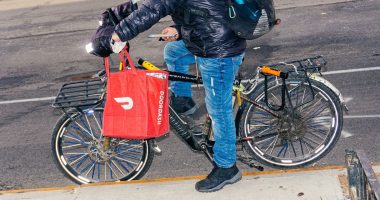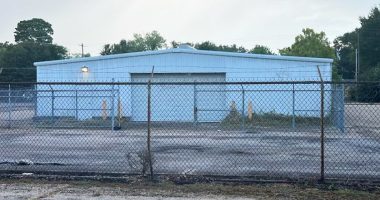
FORT WORTH, Texas—A jury found a former Boeing Co. BA -2.62% pilot not guilty of deceiving air-safety regulators about a 737 MAX flight-control system later blamed for two fatal crashes.
The decision in the four-day trial in Fort Worth was reached after less than two hours of deliberation and acquitted Mark Forkner on all four counts of wire fraud. Mr. Forkner was accused of misleading a training official at the Federal Aviation Administration about an automated cockpit feature to reduce how much training pilots would need to fly the plane, thus making the jet more attractive to airlines.
After U.S. District Judge Reed O’Connor read the verdict, Mr. Forkner became emotional as his lawyers put their arms around him. Crying, he smiled and hugged his wife, who was in the courtroom with other supporters.
Mr. Forkner, 50 years old, declined to comment. His attorneys said they were grateful to jurors for their independence in weighing the Justice Department’s case. “They saw through it, and we’re very grateful,” said David Gerger, one of Mr. Forkner’s attorneys.
A Justice Department spokesman said the agency stands by prosecutors and law-enforcement officials’ efforts to investigate and try the case. “While we are disappointed in the outcome, we respect the jury’s verdict,” the spokesman said.
Mr. Forkner has been the only person charged in relation to the crashes, seen as part of the Justice Department’s effort to hold individuals accountable for their roles in corporate misdeeds.
Mr. Forkner’s attorneys had argued that federal prosecutors targeted him as a scapegoat for the accidents, which claimed 346 lives. They noted that Mr. Forkner wasn’t an engineer and that many others were involved in the flight-control system’s design and certification.
The trial started Friday in a federal courthouse in Fort Worth and was shorter than expected. Mr. Forkner’s attorneys called a single witness—a current Boeing pilot, who testified Wednesday before closing arguments.
The jury had few reservations about its verdict, according to one juror, who declined to provide his name.
“There was a bit of discussion about what more he could have done,” the juror said of Mr. Forkner’s communication with the FAA. The government ultimately provided “very little evidence to support” its claim that Mr. Forkner intentionally sought to deceive his FAA counterpart.
“We saw it as more a corporate and regulatory failure of communication,” the juror said.
Mr. Forkner was the company’s chief technical pilot for the 737 MAX during the airplane’s development. In his role, he was responsible for training materials and pilot manuals for the aircraft. He left Boeing in 2018 to work at Southwest Airlines Co. , which he left in 2020.
Federal prosecutor Mike O’Neill had accused Mr. Forkner of tricking Stacey Klein, his FAA counterpart, into approving lighter training requirements to avoid costing Boeing tens of millions of dollars.
Mr. O’Neill said Mr. Forkner learned that the automated cockpit feature, known as MCAS, had been expanded to activate in low-speed flying conditions but failed to tell Ms. Klein and then sought to cover up his deception.
“It’s lies for money, plain and simple,” Mr. O’Neill said. The prosecutor said Mr. Forkner chose to manipulate Ms. Klein, knowing the professional consequences for himself and financial consequences for Boeing.
Boeing initially designed the 737 MAX’s MCAS system to activate during certain high-speed maneuvers that pilots would rarely encounter so the aircraft would meet certification requirements. But during the aircraft’s development, company engineers decided they would need to expand the system’s authority to push down the plane’s nose in certain low-speed conditions, too.
Accident investigators blamed MCAS for sending two 737 MAX jets into fatal nosedives in late 2018 and early 2019. The crashes prompted a nearly two-year grounding of all 737 MAX planes, disrupting the global aviation industry. In addition to the Justice Department’s criminal investigation, they also led to congressional and regulatory investigations and a new federal law aimed at strengthening oversight of plane manufacturers.
Defense attorneys said Mr. Forkner never learned that MCAS’s authority had been expanded to lower speeds, arguing that he had been kept in the dark by Boeing engineers and test pilots responsible for designing the automated cockpit feature and building the aircraft.
In his closing argument, defense attorney Jeff Kearney sought to discredit Ms. Klein and another key government witness, senior Boeing engineer David Loffing. Mr. Loffing was a senior Boeing engineer assigned to the 737 MAX development before later becoming the chief engineer for the company’s newest plane, the 777X.
Noting that Ms. Klein had testified that she wanted accurate information, Mr. Kearney said Mr. Forkner “gave it to her, when he knew it.” Defense attorneys have said others at the FAA knew about changes to MCAS.
“Make no mistake: Mark Forkner did not lie to Stacey Klein,” Mr. Kearney said.
Defense attorneys also pointed out that the government produced no record of a phone call in which Mr. Loffing claimed he told Mr. Forkner that MCAS had in fact been expanded.
Mr. Loffing testified Tuesday that Mr. Forkner called him after a 2016 simulator experience in which prosecutors claim Mr. Forkner learned the system had been expanded and told a colleague in a chat message: “So I basically lied to the regulators (unknowingly).” Mr. Forkner’s attorneys argued that the former Boeing pilot was complaining about a malfunctioning simulator, not MCAS.
In a settlement with the Justice Department, Boeing last year agreed to pay $2.5 billion to resolve charges that its employees misled the FAA. The deal included a $244 million fine as well as almost $2.3 billion in compensation to airline customers and families of the crash victims.
As Mr. Forkner and his attorneys walked out of the small federal courthouse in downtown Fort Worth, he met the juror who later spoke to The Wall Street Journal.
“It was an easy decision,” the juror told Mr. Forkner.
The juror then asked if a cold vodka was in Mr. Forkner’s future, referring to a drink mentioned during the trial. Mr. Forkner laughed, said maybe and thanked the juror before leaving the courthouse.
Write to Andrew Tangel at [email protected]
Copyright ©2022 Dow Jones & Company, Inc. All Rights Reserved. 87990cbe856818d5eddac44c7b1cdeb8








